Today, January 31, the International Court of Justice (ICJ), the United Nations’ highest judicial body, is set to deliver its verdict in a case brought by Ukraine against Russia. The case involves allegations of “terrorism financing” and “racial discrimination” following Russia’s annexation of Crimea in 2014. The intimations of this ruling are far-reaching, as it not only addresses the immediate legal concerns but also delves into the broader context of the complex geopolitical dynamics between the two nations.
The roots of this legal dispute trace back to 2014 when Russia annexed Crimea, a move widely condemned by the international community. Kyiv, the capital of Ukraine, has accused Moscow of being a “terrorist state,” citing its support for pro-Russian separatists in eastern Ukraine, which Ukraine claims foreshadowed the full-scale invasion of 2022. The case also extends to compensation demands for civilians affected by the conflict and victims of the Malaysia Airlines flight MH17, which was shot down over eastern Ukraine.
Notably, this case predates Russia’s 2022 invasion of Ukraine, and the ICJ is set to decide on Friday whether it has jurisdiction to rule on a separate case related to the more recent conflict.
The ICJ hearings have been ongoing since 2017, marked by lengthy exchanges in the Great Hall of Justice and the submission of thousands of pages of documents. This legal battle is part of Ukraine’s broader strategy of “lawfare”, a term used to describe the use of legal mechanisms to achieve political objectives. Ukraine has sought to leverage international law against Russia on multiple fronts, including maritime law and alleged human rights abuses.
In 2017, the ICJ rejected Kyiv’s initial request for emergency measures to halt Russia’s funding of separatists. The court found that Ukraine had not presented sufficient evidence to prove that Moscow’s funds were directly linked to causing harm to civilians. However, the ICJ did issue an order for Russia to refrain from imposing restrictions on the Crimean Tatars and the use of Ukrainian language in the peninsula.
Ukraine’s approach to resolving conflicts through legal means has been dubbed “lawfare,” and it underscores the evolving nature of international relations. By resorting to international legal institutions, Ukraine aims to hold Russia accountable for its actions and seek justice for the victims of the conflict. The ICJ, though lacking significant enforcement powers, plays a crucial role in providing a platform for states to air their grievances and seek resolutions through legal channels.
The ICJ’s verdict in this case holds immense geopolitical significance. If the court rules in favor of Ukraine, it could set a precedent for holding states accountable for alleged acts of terrorism and racial discrimination. This could influence the behavior of nations engaged in similar disputes and may encourage the international community to scrutinize actions that violate established norms.
On the other hand, if the ICJ rules in favor of Russia, it may bolster Moscow’s position and undermine the credibility of international legal mechanisms. Such a decision could embolden states to act with impunity, potentially setting a troubling precedent for the resolution of conflicts through legal avenues.
The legal proceedings between Ukraine and Russia take place against the backdrop of the ongoing conflict in Ukraine. The 2022 invasion by Russia has further complicated the relationship between the two nations. The ICJ’s decision on whether to exercise jurisdiction over the more recent conflict will shape the course of future legal actions and determine the extent to which international courts can intervene in ongoing conflicts.
Throughout the hearings, both sides have presented strong accusations and counterarguments. Russia’s ambassador to the Netherlands, Alexander Shulgin, has dismissed Ukraine’s claims as “blatant lies and false accusations”. He has accused Ukraine of distorting facts and undermining the credibility of the court.
In response, Ukraine’s top diplomat, Anton Korynevych, has accused Russia of attempting to “wipe us off the map”. Korynevych has highlighted Russia’s illegal occupation of Crimea since 2014 and its alleged campaign of cultural erasure, particularly targeting ethnic Ukrainians and Crimean Tatars.
The ICJ’s verdict in the Ukraine-Russia case will undoubtedly shape the trajectory of international relations and the role of legal mechanisms in resolving conflicts. The ruling’s implications extend beyond the immediate legal concerns, influencing how states navigate geopolitical disputes and adhere to international norms. As the international community awaits the outcome, the verdict may serve as a pivotal moment in determining the effectiveness and credibility of international law in addressing complex and politically charged conflicts.





Amazing work! I totally agree with the ideas discussed in this post.